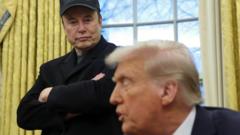Elon Musk, in his first White House appearance, defends his controversial cost-cutting measures and descends into a heated discussion surrounding the implications of his role in government restructuring.
Musk Addresses Government Efficiency Agenda Amid Allegations of Overreach

Musk Addresses Government Efficiency Agenda Amid Allegations of Overreach
Elon Musk reassures the public that his government efficiency initiatives are for the good of democracy during a White House appearance.
In a surprising visit to the Oval Office, Elon Musk sought to clarify his position on government efficiency as he faced accusations of orchestrating a "hostile takeover." Accompanied by President Donald Trump, Musk defended his newly established Department of Government Efficiency (Doge), which aims to reduce the federal workforce and slash government spending amid criticisms from Democrats who have voiced concerns about transparency.
Musk's controversial stance came under scrutiny as he dismissed claims of a government takeover, labeling his initiatives as "common sense." He emphasized the public's desire for substantial government reform, asserting that the results would reflect the will of the voters. "The people voted for major government reform and that's what the people are going to get," he stated.
In his remarks, Musk criticized federal employees, referring to them as an "unelected, fourth, unconstitutional branch of government" that possesses undue influence over elected officials. Trump's administration has championed Musk's cost-cutting efforts, with the president signing an order that empowers Doge to enforce substantial reductions across government agencies. However, challenges loom on the horizon, as Musk's actions have drawn legal hurdles and opposition from Senate Democrats.
Despite the backlash, Musk remains confident, stating, "It's essential for America to remain solvent as a country," in reference to the need for reducing federal expenses. Trump echoed this sentiment, claiming that Doge's initiatives could uncover over $1 trillion in unnecessary spending, although no concrete evidence was provided.
Dems have expressed outrage at what they deem to be a "hostile takeover" of government functions. Senate Minority Leader Chuck Schumer condemned Musk's efforts, accusing the administration of allowing for an unelected body to dictate policy without proper oversight. Meanwhile, as the situation continues to evolve, concerns surrounding Musk's potential conflicts of interest due to his extensive business ties have been raised.
As the federal landscape shifts, Trump's agenda faces scrutiny in the courts, particularly involving efforts to streamline and cut down government operations. The executive order aims for a significant reduction in the federal workforce, stipulating that new hires should not exceed a 1:4 ratio of departures.
A recent CBS News poll indicates that while a majority of Americans support Musk's spending cuts, there is a divided opinion regarding his level of influence. The ensuing debate around Musk's initiatives and their implications on US governance promises to intensify in the coming weeks, with various stakeholders preparing for a war of attrition on both political and legal fronts.
Musk's controversial stance came under scrutiny as he dismissed claims of a government takeover, labeling his initiatives as "common sense." He emphasized the public's desire for substantial government reform, asserting that the results would reflect the will of the voters. "The people voted for major government reform and that's what the people are going to get," he stated.
In his remarks, Musk criticized federal employees, referring to them as an "unelected, fourth, unconstitutional branch of government" that possesses undue influence over elected officials. Trump's administration has championed Musk's cost-cutting efforts, with the president signing an order that empowers Doge to enforce substantial reductions across government agencies. However, challenges loom on the horizon, as Musk's actions have drawn legal hurdles and opposition from Senate Democrats.
Despite the backlash, Musk remains confident, stating, "It's essential for America to remain solvent as a country," in reference to the need for reducing federal expenses. Trump echoed this sentiment, claiming that Doge's initiatives could uncover over $1 trillion in unnecessary spending, although no concrete evidence was provided.
Dems have expressed outrage at what they deem to be a "hostile takeover" of government functions. Senate Minority Leader Chuck Schumer condemned Musk's efforts, accusing the administration of allowing for an unelected body to dictate policy without proper oversight. Meanwhile, as the situation continues to evolve, concerns surrounding Musk's potential conflicts of interest due to his extensive business ties have been raised.
As the federal landscape shifts, Trump's agenda faces scrutiny in the courts, particularly involving efforts to streamline and cut down government operations. The executive order aims for a significant reduction in the federal workforce, stipulating that new hires should not exceed a 1:4 ratio of departures.
A recent CBS News poll indicates that while a majority of Americans support Musk's spending cuts, there is a divided opinion regarding his level of influence. The ensuing debate around Musk's initiatives and their implications on US governance promises to intensify in the coming weeks, with various stakeholders preparing for a war of attrition on both political and legal fronts.





















